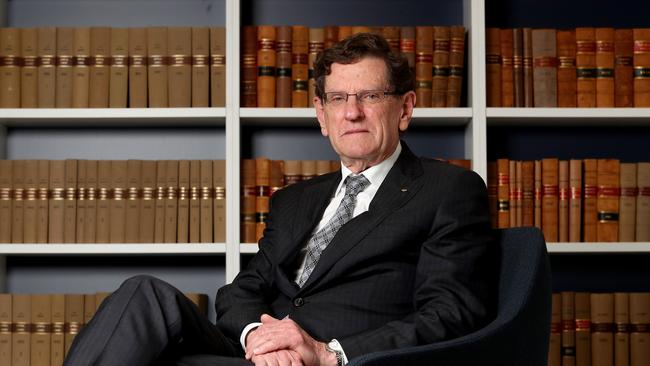Unis in a bind as ‘hate speech’ lines blur
Former High Court chief justice Robert French raises concern that “hate speech” has lost its meaning.

Former High Court chief justice Robert French has raised concern that “hate speech” and “bullying” have lost their meaning, reiterating a call for controversial speakers and protesters to be afforded freedom of speech at Australian universities.
But the University of Western Australia chancellor, who conducted a review of freedom of speech on campuses for the federal government, acknowledged that university administrators had difficult decisions to make.
Speaking in Brisbane yesterday, Mr French was asked whether one person’s hate speech might be another person’s freedom of speech, and suggested the lines had blurred. “Hate speech is very broadly defined now and it’s got away from the core meaning of hate,” Mr French said.
“Hate means to loathe or despise. When you broaden out the term hate, what you’re doing is you’re borrowing the negative moral connotations from its core meaning and you’re applying it to a much wider range of conduct, which you call hate speech.
“Now, maybe that’s just language evolving, but it always worries me a bit, just the same way as the term of bullying has now been smeared out in a way that picks up all sorts of conduct, which might include someone telling someone to lift their game.”
Mr French did not accept that freedom of speech was in crisis, despite the cancellation of some high-profile speaking events, but said the debate over such events “can have a reputational effect on universities”. He said university administrators had to consider and balance other factors, such as public safety and public health, to make complex decisions in such cases. “Suppose you’ve got someone who wants to use the facilities … proposing that vaccination is linked to autism, so it’s an anti-vaxxer campaign, and there’s a view that there is a public health issue associated with the promotion of that view,” Mr French said.
“You say: ‘We’re not going to allow that view on our campus, it’s intellectual rubbish, and it’s harmful’. All right, suppose you draw that line, what about someone who then comes along and wants to say Western medicine is a hoax, we should all use natural therapies and buy Blackmores at the pharmacist. Again, one could say there’s an argument that there’s a more diffuse harm there, so where does one draw the line?”
He recalled a “transgender sceptic” who planned to speak at the UWA until the threat of protests, and the lack of an adequate public safety strategy, forced the university to withdraw approval.
“We then got a lot of emails of protest the other way … with equal levels of stridency; one side saying ‘you’re moral cowards and I’m ashamed to be (associated with) this university’, and the other side saying ‘you lack backbone and I’m ashamed to be (associated with) this university’.
“They’re very hard judgments to make sometimes: obviously one prefers to allow speech to go ahead, however obnoxious the particular views might be.”
Mr French met with representatives of Universities Australia yesterday and said other institutions were considering the model code of principles he recommended in his review. “The code is not intended to be a one-size-fits-all, it’s intended to be capable of adaptation to specific institutional circumstances,” he said.



To join the conversation, please log in. Don't have an account? Register
Join the conversation, you are commenting as Logout